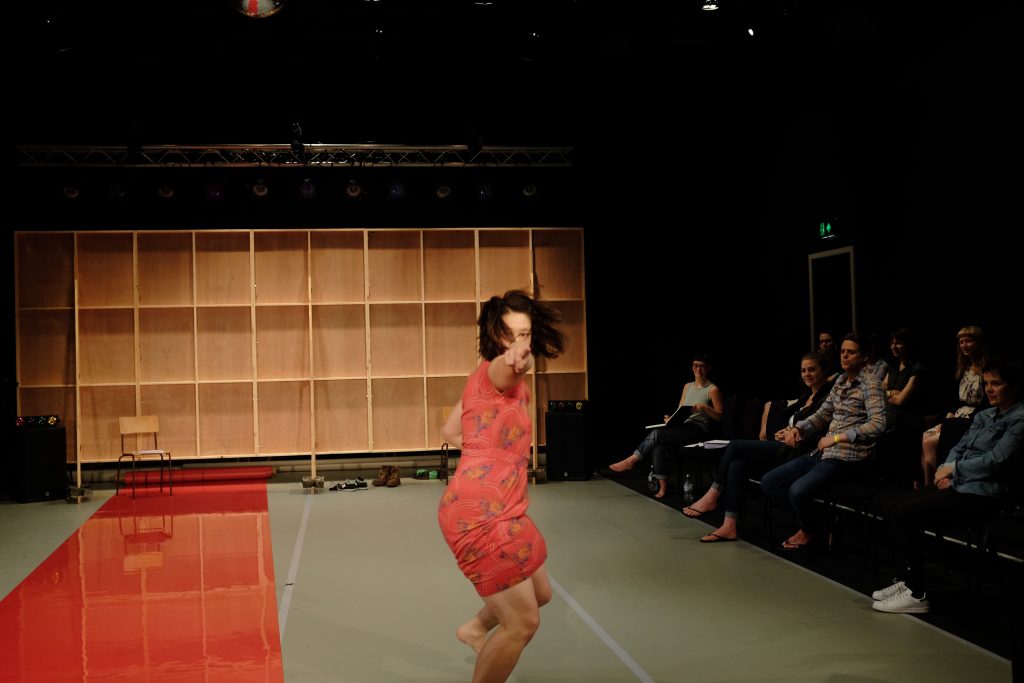In Wallflower, Quarantine challenges you to remember all the dances you’ve danced in your life – because what you remember is who you are.
Try it yourself. Take a few minutes to remember the dances you’ve danced over the last few years. Why were you dancing? With whom? What music was playing? How did you feel? The more dances you remember, the better they serve as a framework for memory: the housewarming party of a new home…. the birth of your child… the day you met…
The premise of the Wallflower was to do something about how we deal with the unexpected events of our lives, says Gregory. “Many things happen in our lives that are beyond our control. Shit happens. The question is how you deal with it.”
Catalyst
To map their personal memories, Gregory asked his performers to try to remember every dance they have ever danced. They came up with so many interesting things that the game eventually became the key thread of the show. “The performers were worried that they wouldn’t have enough memories to fill the performance, but one memory seems to inspire another… it’s apparently an almost inexhaustible source.”
Why dance as a catalyst for remembering (and therefore the theme of the show) works so well is because it is so recognisable, says Gregory. “We all have memories of dancing – or sometimes the non-dancing on the side-lines. Everyone recognises the principle, even if you don’t like to dance. You can set the different dances in your life in a certain context. A certain time, a certain relationship, a period in time.”
The different performers in the show have completely different relationships with dance, and that is significant when it comes to forming who they are. “Jo has danced professionally for thirty years. She has performed thousands of times and worked with great choreographers. Her relationship with dance is mainly professional. Sonia is not a dancer, but at a party she is straight on the dancefloor. Her dancing is mostly social, so her memories of dance are totally different from Jo.”
“I’m interested in the relationship between remembering and identity. How do we remember who we are? And in what ways do we remember our own history? Theatre is a place where recall is central, if only to remember a text. The most exciting moment in theatre is when the performer almost forgets the script. Then, suddenly, something really happens: you see the act of remembering. That’s what I find interesting. Seeing the act of remembering is just as important as precise memory itself.”
Greek heroes
Through the continuous search for memories, Wallflower creates theatrical portraits of the performers. “I am becoming increasingly aware that what we do at Quarantine is a form of portraiture. I ask the performers to make a self-portrait in a theatrical context, framed by me as the director, but in which the public plays an important role through the expectations, personal experiences and memories they bring. Thus, the viewer is also creating a self-portrait.”
In Quarantine’s work, the performers are themselves. The memories that are shared in Wallflower are real. Why does Gregory think authenticity is so important? “Actually I don’t. But often, characters in theatre are very far removed from us. Like Greek heroes or kings. I want to show people that look like us. We can see ourselves in relation to the other and maybe even learn something about ourselves. The image that we present of ourselves, in this digital age, is quickly far removed – our sense of self is elusive. We create long feeds of fragmented identities, but lose the ability to inhabit an image for very long. Either to linger on our self-portrait or to look for another. Watching a live person on stage can be very satisfying.”
Interview | Robbert van Heuven
Translated by Hannah Hiett
Wallflower premieres at Nooderzon Performing Arts Festival (NL) 28 – 30 August 2015
